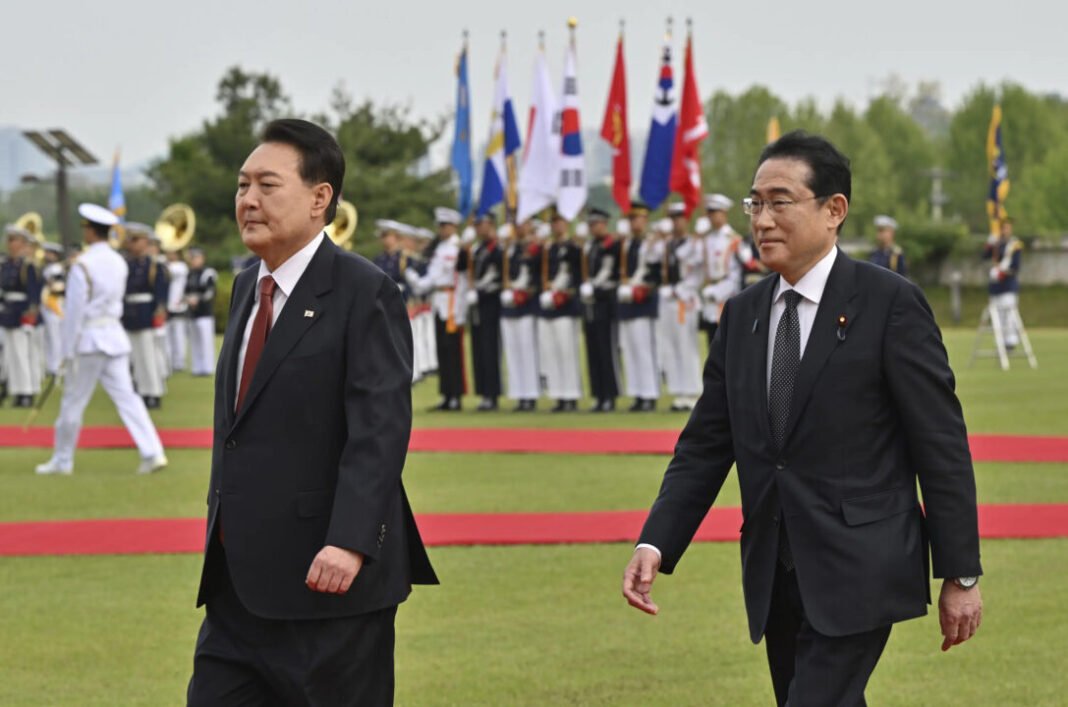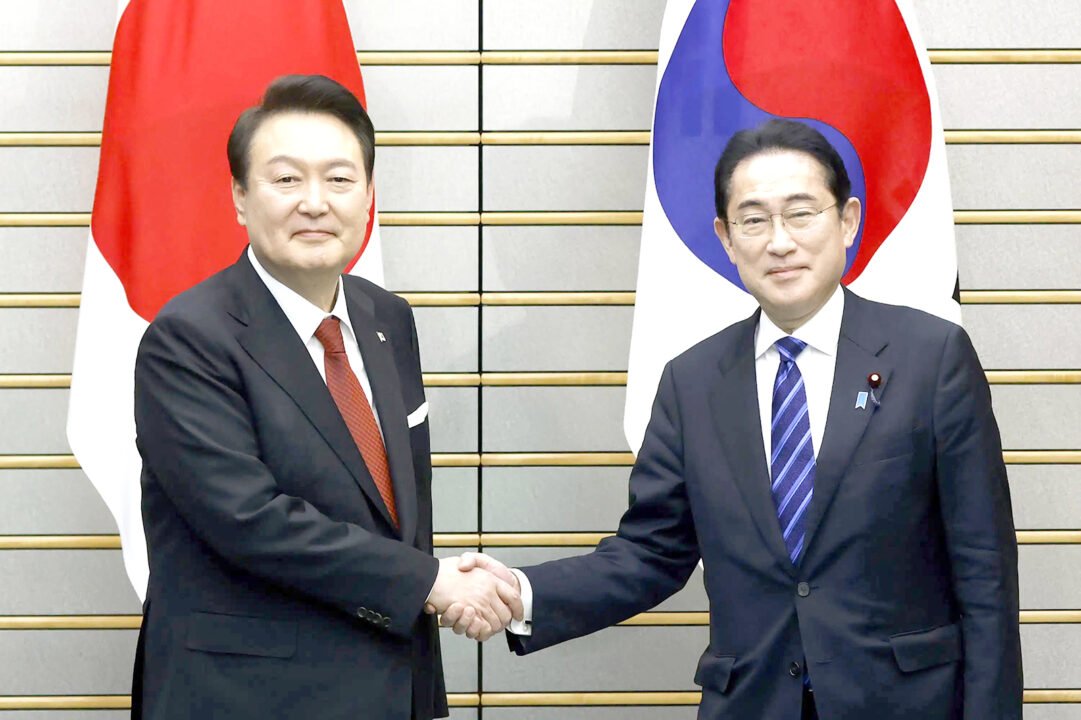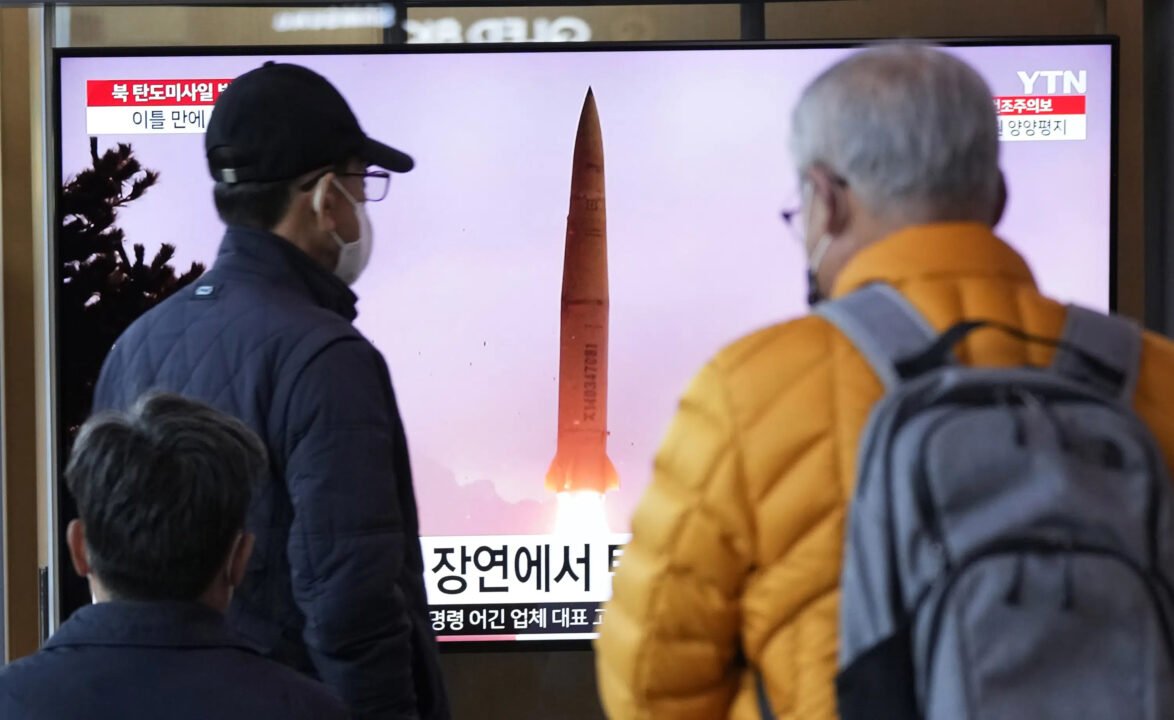SEOUL, May 7 (AP): The leaders of South Korea and Japan met on Sunday for their second summit in less than two months, as they push to mend long-running historical grievances and boost ties in the face of North Korea’s nuclear programme and other regional challenges.
Japanese Prime Minister Fumio Kishida arrived in South Korea earlier on Sunday for a two-day visit, which reciprocates a mid-March trip to Tokyo by South Korean President Yoon Suk Yeol. It was the first exchange of visits between the leaders of the Asian neighbours in 12 years.
South Korean media attention on the summit is focused on whether Kishida will make a more direct apology over Japan’s 1910-45 colonial rule of the Korean Peninsula. Such comments by Kishida would likely help Yoon win greater support for his push to build stronger ties with Japan and ease domestic criticism that he’s preemptively made concessions to Tokyo without receiving corresponding steps in return.
“It took 12 years to restore the shuttle diplomacy’ but our exchange of visits took less than two months,” Yoon said at the start of the meeting. “I think this confirms that South Korean-Japan relations, which have started fresh, are moving forward with a speed.”
Yoon said cooperation between Seoul and Tokyo is essential considering “the current grave international political situation and the global polycrisis”.
He didn’t elaborate, but has previously cited North Korea’s advancing nuclear programme, the intensifying US-China strategic rivalry and global supply chain problems as reasons for greater cooperation with Japan.
Kishida said he and Yoon plan to exchange views to further develop bilateral relations. Kishida said that “a series of dialogues has dynamically started moving” since his summit with Yoon in March, during which he said the two leaders “wiped out somewhat shrunk mood to strengthen our dialogue and cooperation.”
South Korean and Japanese officials said their leaders would discuss North Korea’s nuclear programme, South Korean-Japanese economic security and overall relations, and other unspecified international issues.
Ahead of his summit with Yoon, Kishida and his wife, Yuko Kishida, visited the national cemetery in Seoul, where they burned incense and paid a silent tribute before a memorial.
Buried or honoured in the cemetery are mostly Korean War dead, but include Korean independence fighters during the period of Japanese rule. Kishida was the first Japanese leader to visit the place in 12 years.
In their March summit, Yoon and Kishida agreed to resume leadership-level visits and other talks. In recent weeks, the two countries have also withdrawn the economic retaliatory steps they had earlier taken against each other in previous years when their history row rekindled.
The most recent sticking point in their ties was 2018 court rulings in South Korea that ordered two Japanese companies to financially compensate some of their aging former Korean employees for colonial-era forced labour.
The verdicts angered Japan, which has argued that all compensation issues were already settled when the two countries normalised ties in 1965.
In an escalation of tensions, the two countries later downgraded each other’s trade status, while Seoul also threatened to spike a military intelligence-sharing pact. Some activists and residents in South Korea staged campaigns to boycott Japanese products, as well.
The strained South Korea-Japan ties complicated US efforts to build a stronger regional alliance to better cope with rising Chinese influence and North Korean nuclear threats.
In March, however, Yoon’s conservative government took a major step toward mending the ties by announcing it would use local funds to compensate the forced labour victims without demanding contributions from Japanese companies. Later in March, Yoon travelled to Tokyo to meet with Kishida.
Yoon’s push drew strong backlash from some of the forced labour victims and his liberal rivals at home, who have demanded direct compensation from the Japanese companies.
In late April, Yoon made a state visit to the United States and agreed with President Joe Biden to reinforce deterrence capabilities against North Korea’s nuclear threats. During a joint news conference, Biden thanked Yoon “for your political courage and personal commitment to diplomacy with Japan.”
“White House officials have expressed some frustration with the tepid response from Tokyo on the forced labour compensation deal and hope that Kishida will use an upcoming visit to South Korea in early May to do more,” Victor Cha, senior vice president for Asia and Korea Chair at the Centre for Strategic and International Studies, wrote in an analysis published last week.
Yoon, Biden and Kishida are expected to hold a trilateral meeting later this month on the sidelines of the Group of Seven meetings in Hiroshima to discuss North Korea, China’s assertiveness and Russia’s war on Ukraine.
Yoon was invited as one of eight outreach nations.
After his March summit with Yoon, Kishida said he upholds the positions of previous Japanese governments including one carried in the landmark 1998 joint declaration by Tokyo and Seoul on improving ties, but didn’t make a new apology.
In the 1998 declaration, then-Japanese Prime Minister Keizo Obuchi said that “I feel acute remorse and offer an apology from my heart” over the colonial rule.
Japanese governments have expressed remorse or apologies over the colonial period numerous times. But some Japanese officials and politicians have occasionally made comments that have been accused of whitewashing Tokyo’s wartime aggressions, prompting Seoul to urge Tokyo to make new, more sincere apologies.
Asked whether he would discuss the forced labour victims with Yoon, Kishida said in his pre-departure comments: “We will frankly exchange our views on this.”
Seoul and Tokyo have a slew of other sensitive historical and territorial disputes, mostly related to the Japanese colonisation. In a reminder of the delicate nature of their ties, diplomats between the two countries last week spatted over a South Korean lawmaker’s visit to disputed islets located in the waters between the two countries.
Earlier, Seoul protested Kishida’s offering of religious offerings to a Tokyo shrine that it views as a symbol of Japan’s wartime aggression.












